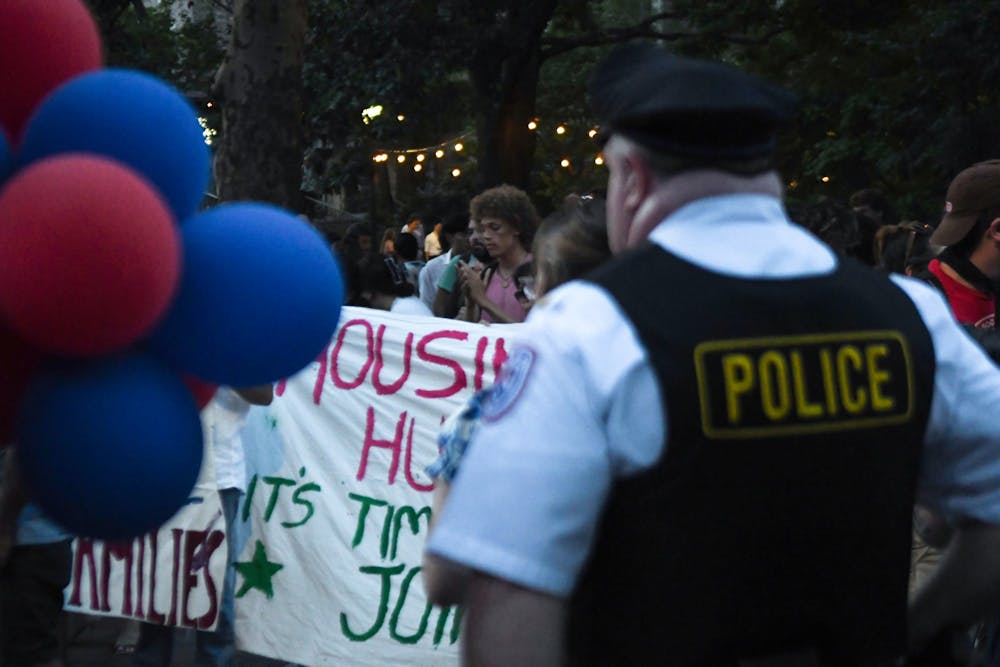Meeting the chants of dozens of protesters crashing one of the largest first-year events, new Penn President Liz Magill simply replied with: “My message tonight is about the importance of productive disagreement. … May I go back to my speech?”
Penn’s image as a university heavily involved in the community is one that is consistently touted in every admissions brochure, tour, speech and mission statement. Civic engagement is an inseparable part of the University’s brand. And yet, when faced with radical, disruptive action from the community — like from the recent Save the UC Townhomes protest at convocation — University officials easily dismiss their demands under the guise of “productive disagreement.”
At times feeble, at times aggressive, but mostly entirely dismissive, Penn's actions — or lack thereof — in response to student activism stand in stark contrast to their branding as a university centered around community involvement. What civic engagement really means for Penn is something that we, especially the new students still navigating this unfamiliar environment, must question.
The conscious choice to organize the convocation protest to be publicly visible and actively disruptive was crucial to expose the University's complicity in the forcible displacement of Black families and President Magill and the Board of Trustees’ ambivalence towards the organizers’ demands. By doing so, new community members were made aware of the months-long fight to prevent the impending eviction of 68 families just blocks from campus while, simultaneously, intense pressure was applied on the new administration.
While some students’ irritation towards the convocation protest is, to an extent, understandable — and Magill’s indignation, expected — the protest accomplished exactly what it was designed to do: disrupt. In choosing to demonstrate at one of the biggest events of the year, attended by virtually every top university official and a sizable portion of the student body, the Coalition achieved radical visibility for the cause in front of thousands of community stakeholders.
Disruptive protests with radical demands have a storied — and occasionally successful — history at Penn. Student-led protests led to the creation of the current Africana Studies department and establishment of DuBois College House, as well as the introduction of courses in Asian American Studies. Yet, for every protest, there is an equally striking story of Penn’s repression. Workers’ attempts at unionizing were met with aggressive union-busting tactics, and last semester Fossil Free Penn’s encampment was met with hostile police response, among countless other examples. Penn, in an attempt to intimidate student activists involved in both the convocation protest and the current College Green encampment, has threatened students with disciplinary action.
Any actions from Penn have always been performative, with the goal of placating and ultimately silencing students — for example, Amy Gutmann participating in students’ “die-in” for the cameras, but then refusing to entertain their demands. Penn has consistently positioned itself as explicitly anti-radical; countless student protests and lists of detailed demands are met with empty platitudes, then business as usual — “May I go back to my speech?”
Penn’s largely disingenuous vision of civic engagement must be understood within the context of the fact that the status quo benefits the University to the tune of hundreds of millions of dollars a year. In the absence of any active public challenges to its financial and administrative operations, Penn is able to continue its highly profitable and damaging activities with next to no transparency. Penn’s institutional greed is the biggest obstacle to progress.
SEE MORE FROM VINAY KHOSLA AND TAJA MAZAJ:
To this end, Penn has created an environment where meaningful protest isn’t necessarily easy and accessible; they have a vested interest in pushing down, co-opting, and sanitizing radical thought and action. But that’s why activism, especially disruptive public activism, is all the more necessary. And it has been successful before, even at other extremely wealthy and prestigious institutions — after student pressure, Harvard divested from fossil fuels, and despite resistance from their administration, Columbia student workers managed to form a union.
Truly meaningful civic engagement does not fit into the neat boxes Penn provides — after all, it’s in Penn’s best interest that a culture of silence prevails around their institutional negligence and profiteering. But part of being an engaged student is constantly questioning and challenging the University’s power, and putting those in charge in uncomfortable positions which force them to listen.
By all means, take advantage of the variety of civic engagement resources available to you during your time at Penn: there are many, and they will certainly enrich your educational experience. But don’t expect these nondisruptive, nonradical routes of engagement to bring about change.
Protecting Penn — or remaining indifferent — will not protect you. If you are really interested in civic engagement at Penn, learn about its history. Learn about the MOVE bombing, the Morton Collection, the decades of displacement and Penntrification, their neglect of Philly public schools, their experiments on prisoners, ties to slavery, their excessive policing, and their unremitting exploitation of, and violence against, the city that houses them.
Understand this history, and help fight against its replication. It’s not going to boost your résumé and it won’t fit neatly into the programs Penn provides us, but it’ll be one of the most important things you do during your time at Penn.
Penn is not an abstract, benevolent force, but a multibillion dollar institution with entrenched interests which have tangible impacts on Philadelphia, the environment, and the world. Protests are loud, they are messy, and they are inconvenient. But this is how change occurs.
After all, how is change anything but disruptive?
VINAY KHOSLA is a College sophomore studying history and political science from Baltimore, Md. His email is vkhosla@sas.upenn.edu.
TAJA MAZAJ is a College junior studying political science from Skippack, Pa. Her email is tajam@sas.upenn.edu.
SEE MORE FROM VINAY KHOSLA AND TAJA MAZAJ:









